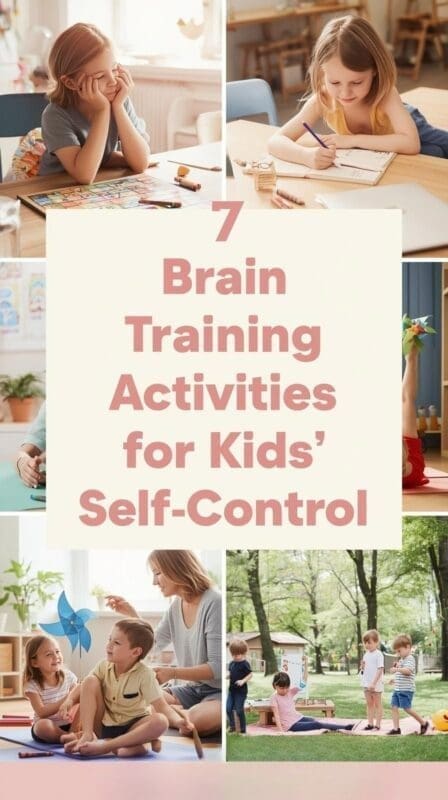Just like muscles get stronger with exercise, the brain builds self-control through practice. Kids don’t learn emotional regulation from a single lesson — they learn it through daily repetition in everyday routines.
These seven brain training activities help children practice focus, patience, and self-regulation at home, in therapy, or in the classroom. They’re simple, practical, and backed by neuroscience.
1. Morning Mindfulness Minute
How it works:
- Start the day with one minute of deep breathing or quiet reflection.
- Use a visual timer or calm music to keep focus.
Why it helps: Builds consistency and sets a calm tone for the day.
2. The Waiting Game
How it works:
- Challenge kids to wait a short time (for a treat, toy, or turn).
- Gradually increase the waiting period.
Why it helps: Strengthens delay of gratification, a key self-control skill.
3. Movement & Freeze Play
How it works:
- Play games like Freeze Dance or Red Light, Green Light.
- Mix in silly prompts to keep engagement high.
Why it helps: Teaches kids to start and stop actions on cue, practicing inhibition.
4. Brain Break Puzzles
How it works:
- Offer short puzzles, mazes, or simple crosswords during breaks.
- Keep activities to 5–10 minutes.
Why it helps: Builds focus and problem-solving while giving structure to downtime.
5. Mealtime Gratitude Ritual
How it works:
- Before eating, each family member names one thing they’re grateful for.
Why it helps: Shifts attention to positive thoughts and trains emotional flexibility.
6. Homework Focus Intervals
How it works:
- Set a timer for 10–15 minutes of focused work, followed by a short stretch break.
- Increase focus intervals gradually.
Why it helps: Strengthens attention span and task persistence.
7. Bedtime Reflection Routine
How it works:
- End the day by asking: “What went well today? What can I try differently tomorrow?”
- Encourage kids to write or draw responses.
Why it helps: Builds self-awareness and prepares kids to apply regulation skills tomorrow.
Final Thoughts
Brain training for kids doesn’t require fancy tools — just consistent, everyday practices like waiting games, gratitude rituals, and reflection routines. With repetition, children strengthen their “self-control muscle,” giving them skills to handle challenges with more patience and confidence.
For more strategies, explore my guides on The Brain Is Like a Muscle and Therapy Games That Teach Kids to Pause and Think.

About the Author
Hi, I’m Eve, a former school counselor with a master’s degree in School Psychology and a passionate advocate for children and families navigating sensory challenges. As a mom of children with sensory sensitivities, I deeply understand the journey special-needs parents face, and I dedicate myself to researching and sharing practical solutions to help children thrive and feel comfortable in their bodies. My goal is also to empower counselors, therapists, and psychologists with creative strategies and supportive resources to enrich their everyday practice. When I’m not writing or exploring new therapeutic approaches, you’ll find me spending quality time with my family and continually seeking inspiration from everyday moments.



